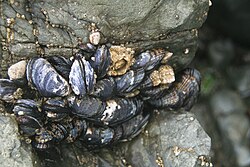Mytilus californianus
| California mussel | |
|---|---|
 |
|
| Scientific classification | |
| Kingdom: | Animalia |
| Phylum: | Mollusca |
| Class: | Bivalvia |
| Subclass: | Pteriomorpha |
| Order: | Filibranchia |
| Suborder: | Mytilacea |
| Family: | Mytilidae |
| Genus: | Mytilus |
| Species: | M. californianus |
| Binomial name | |
|
Mytilus californianus Conrad, 1837 |
|
The California mussel (Mytilus californianus) is a large edible mussel, a marine bivalve mollusk in the family Mytilidae.
This species is native to the west coast of North America, occurring from northern Mexico to the Aleutian Islands of Alaska. California mussels are found clustered together, often in very large aggregations, on rocks in the upper intertidal zone on the open coast, where they are exposed to the strong action of the surf.
The shell of this species is thick and is often 80 to 130 mm in length, sometimes larger still. The shell is blue on the outside with a heavy brown periostracum which is usually worn off except near the growing edge of the shell. The beaks of the shell are often eroded. The shell has coarse radial ribbing and irregular growth lines on the outer surface. The inner surface of the shell is blue and faintly pearly.
Like other mytilids, the animal is attached to the substrate with a very strong and elastic byssus.
The California mussel prefers the high salinity, low sediment conditions found on open rocky coasts. However, they do not colonize bare rock easily, instead preferring the shelter of pre-existing mussels and their biological filaments. Mussels attach themselves to the hard surfaces using their thread-like byssus.
Given the right circumstances, California mussels can grow up to 200 mm (8 inches) in length and may live for more than 20 years. However, mortality in intertidal open coastal environments is often high, resulting from battering from driftwood and other debris, wave pounding, predation, desiccation, and disease. Predators of California mussels include the Pisaster starfish. Their most common food is Phytoplankton.
...
Wikipedia
